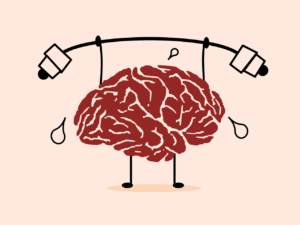Obsessive-Compulsive Disorder (OCD) is a chronic and debilitating mental health condition. However, there is hope for individuals with OCD in the form of Exposure and Response Prevention (ERP) therapy. In this blog post, we will explore how ERP exposure therapy can help individuals with OCD to confront their fears and reduce their compulsive behaviors. We will also discuss some alternatives to ERP therapy.
Contents
What Is ERP Therapy?
Exposure and Response Prevention (ERP) therapy is a type of cognitive-behavioral therapy (CBT) often used to treat Obsessive-Compulsive Disorder (OCD). In ERP, the individual is gradually exposed to situations or objects that trigger their obsessions, and then they are prevented from engaging in their typical compulsive response. This helps to break the cycle of obsessions and compulsions, and over time, reduces the severity of OCD symptoms. ERP can be an effective treatment for OCD, but it can be challenging and distressing for some individuals. Therefore, it is important to work with a qualified therapist who can guide you through the process and provide support and encouragement along the way.
Process Of ERP Therapy
Here is how ERP therapy is typically delivered:
Assessment
 The therapist conducts a thorough assessment of the individual’s symptoms and develops a treatment plan. This assessment decides the stage of OCD condition of a patient. The patient is identified as mild, moderate, or severe stage depending upon the symptoms. A well- designed treatment plan is prepared for the patient to decide the further steps to be taken.
The therapist conducts a thorough assessment of the individual’s symptoms and develops a treatment plan. This assessment decides the stage of OCD condition of a patient. The patient is identified as mild, moderate, or severe stage depending upon the symptoms. A well- designed treatment plan is prepared for the patient to decide the further steps to be taken.
Psychoeducation
The therapist educates the individual about OCD and ERP therapy. Patient and the family members get to know about the procedure and treatment plan in detail. Also, the therapists discusses the various measures and strategies that will be involved in the process.
Exposure
The individual is gradually exposed to situations, objects, or thoughts that trigger their obsessions. These fears or obsessions are kept mild so that patient identifies the situation. This ultimately helps in getting well- prepared in advance so that future compulsions can be controlled.
Response Prevention
The individual is prevented from engaging in their typical compulsive behaviors. This breaks the cycle of compulsions or intrusive thoughts. Response prevention can be somewhat difficult at initial stages. But, gradually the patients start learning to prevent and control the symptoms.
Hierarchy
The therapist works with the individual to create an exposure hierarchy, which is a list of anxiety-provoking situations ranked from least to most distressing. This is quite similar to learning a new video game or a language where the difficulty increases to next level.
Sessions
The individual attends regular therapy sessions, during which they complete exposure tasks and discuss their progress. Therapy sessions also typically involve discussing the individual’s progress and setbacks, setting new exposure goals, and providing support and encouragement throughout the process. Number of sessions needed by the patient depends on his progress. However, usually it takes about 12-20 sessions for desired results.
Homework
The individual completes exposure tasks outside of therapy sessions to reinforce their progress. This is similar to a child learning from school as well as his home to fasten his progress. Patient and his family members can be given tasks to perform at their own pace or residence.
Benefits Of ERP Therapy

ERP exposure therapy helps in providing the following benefits:
- Reducing anxiety: ERP therapy can help reduce anxiety and distress associated with obsessions and compulsions.
- Breaking the cycle: ERP therapy helps individuals to break the cycle of obsessions and compulsions by preventing them from engaging in their typical compulsive behaviors.
- Improving tolerance: As a result, gradually increasing the level of exposure can increase the tolerance rate of the patient.
- Increasing independence: By reducing compulsive behaviors, individuals with OCD can become more independent and less reliant on others for support.
- Long-lasting effects: Unlike medication, the effects of ERP therapy are long-lasting and can provide lasting relief for OCD symptoms.
- Enhanced self-esteem: As a result of successfully completing exposure tasks, individuals with OCD can feel a sense of accomplishment and an enhanced sense of self-esteem.
Why Is ERP Therapy A Gold Standard Treatment?

ERP Exposure Therapy is non-pharmacological option considered as a gold standard treatment for OCD because of its high success rate. It involves no medications, hence, has lower risks or side effects as well. It is evident that this type of CBT is the most effective therapy to treat OCD symptoms. ERP therapy can be delivered to children, adolescents as well as adults. Moreover, it can be combined with Pharmacotherapy for patients who fail to respond to other therapies.
Alternatives To ERP Exposure Therapy
Given Below are some alternative treatments to ERP exposure therapy:
Behavioral therapy (BT): It focuses on changing behaviors and teaching new coping skills. This helps individuals with OCD identify and change behaviors that are maintaining their obsessions and compulsive behaviors. It might also involve changing some environment or social influence of the patient.
Cognitive Behavioral Therapy (CBT): It focuses on changing thought patterns and beliefs. This type of therapy helps OCD patients to recognize and challenge the negative thoughts and beliefs that are fueling their obsessions and compulsive behaviors.
Acceptance and Commitment Therapy (ACT): It focuses on helping children cultivate a sense of acceptance and mindfulness in the face of their obsessive thoughts and compulsive behaviors.
Family-Based Therapy (FBT): It involves the family in the therapeutic process. It is based on the idea that family members can play a critical role in helping individuals manage their OCD symptoms and recover. FBT focuses on educating family members and providing them with strategies to support their loved ones in managing their symptoms.
Conclusion
In conclusion, ERP exposure therapy is a highly effective and evidence-based treatment for OCD. Through gradually exposing individuals to anxiety-provoking situations or objects and preventing them from engaging in their typical compulsive behaviors. ERP therapy has been more effective than medication or supportive therapy alone. Also, it can provide lasting relief for OCD symptoms.
Although ERP therapy can be challenging and distressing, with the help of a qualified therapist, individuals with OCD can successfully confront their fears and reclaim their lives. If you or someone you know is struggling with OCD, seeking help from a qualified mental health professional can be the first step towards finding relief through ERP therapy.
For more information and guidance, please contact MantraCare. OCD is a mental health disorder characterized by obsessions and compulsions. If you have any queries regarding Online OCD Counseling experienced therapists at MantraCare can help: Book a trial OCD therapy session.


